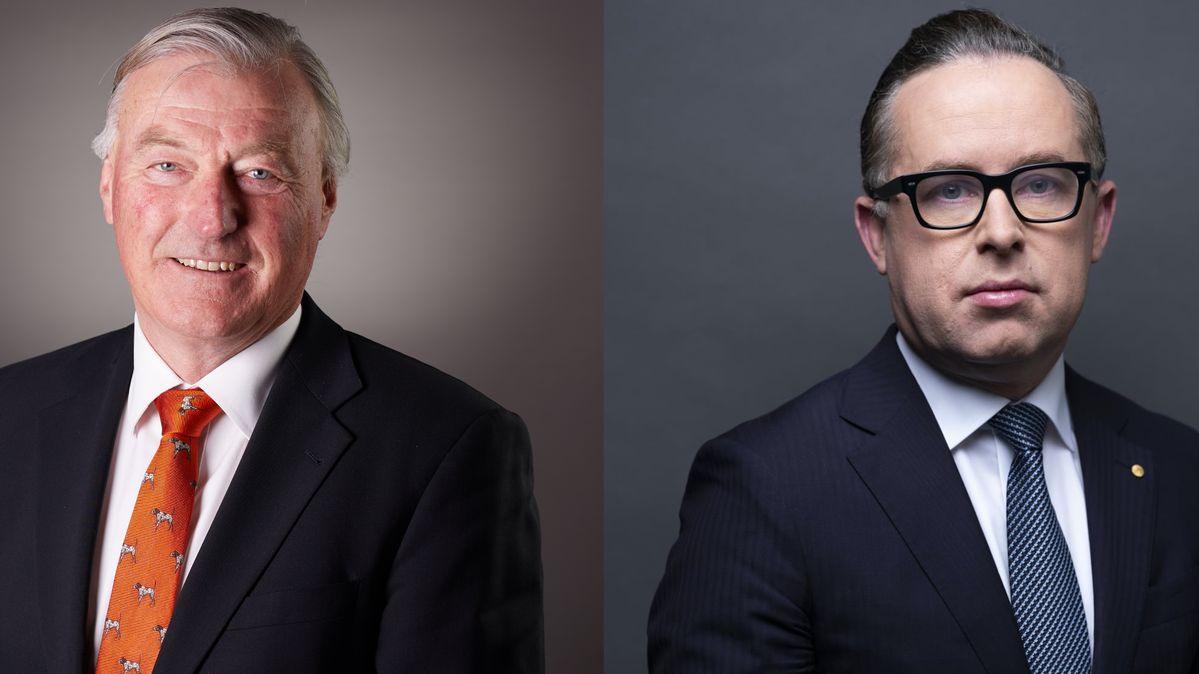John Sharp, Alan Joyce swap barbs over Rex vs Qantas
It's a war of words as two of Australia's top airline chiefs trade tirades, and cite Monty Python along the way.

Regional Express deputy chairman John Sharp and Qantas Group CEO Alan Joyce have exchanged verbal broadsides as the airlines engage in a dogfight over domestic air travel in the post-pandemic era.
Sharp, who has lobbed many shots at Qantas and Joyce since Rex announced entered the domestic jet market, launched an attack on its arch-rival via an opinion piece printed in The Australian Financial Review on April 20.
Joyce fired back today with what is, for both himself and Qantas, an unprecedented smackdown of Sharp's claims and Rex's aviation record – and in the process compared Regional Express to The Black Knight in Monty Python and the Holy Grail.
Below, Executive Traveller reproduces in full the statements of both Sharp and Joyce.
No, Mr Joyce, Qantas’ ‘best game’ doesn’t beat Rex
Qantas is once again bragging about how formidable it is. In a CAPA forum last week, Qantas chief executive Alan Joyce boasted that “when Qantas plays its best game, it always wins”. He then went on to discredit Rex for the third time in as many months in an attempt to cast doubts about Rex’s viability.
Rex’s patience has a limit. It is now time to set the record straight.
Alan Joyce denied this paranoia of competition was behind recent comments where he questioned the ability for Rex and Virgin to survive as they duke it out in the middle of the market. Rhett Wyman
It is ironic that since Alan Joyce became CEO in 2008, Qantas has chalked up one of the biggest corporate losses in Australian history with a staggering net profit before tax (PBT) loss of $1.8 billion, of which $68 million was his personal remuneration.
He will argue that he has presided over a very difficult environment.
This is true, but Rex, operating in the same environment and over the same period, achieved a net PBT of approximately $200 million (which, if extrapolated to the scale of Qantas, would be the equivalent of $11 billion).
Other carriers, such as Singapore Airlines and Cathay Pacific, also managed to record about $4 billion in net PBT over the same period even though they have been harder hit by COVID-19 due to the lack of a domestic market.
Even Alan Joyce must realise that he cannot seriously claim that Qantas played a ‘good game’ under his watch. Could he instead be reminiscing about a glorious past?
If so, once again he is sadly off the mark as Qantas managed to turn in an average gross return on revenue of only 2.3 per cent since it was privatised in 1995.
In comparison, Rex has turned in 7 per cent since its listing in 2005. Not such a “good game” for Qantas.
Qantas is now so desperate that it is willing to risk universal ridicule just to get its hands on more cash at any cost.
This brings us to the situation today. Again Qantas likes to brag how strong it is and how it has enough liquidity for a two-year runway to see through this pandemic.
This is disturbingly similar to what Virgin Australia was loudly proclaiming just prior to its collapse.
According to its most recent half yearly report, Qantas now has negative net tangible assets – undoubtedly the only company on the ASX 100 with this dubious honour.
Its borrowings are a staggering $7 billion as at year-end 2020. In fact, it is much more – it has $5 billion of advanced tickets sales on its books, half of which are classified as non-current.
Qantas continues to burn cash at an alarming rate – its operational cash burn for first half 2021 was approximately $860 million. Its much vaunted $2 billion in cash holdings are largely encumbered by the banks to secure against the $5 billion of advance-sale tickets, most of which is due to be refunded.
It could be argued that Qantas is now technically insolvent since its limited unencumbered cash would not be sufficient to meet all of its liabilities that have fallen due, especially the refundable tickets worth billions.
Qantas went to Canberra cap in hand recently and it is no coincidence that shortly after, a massive bailout was announced by the Commonwealth which granted Qantas more than $800 million of aid, on top of the $1.2 billion it had received prior to that.
Joyce is now deafeningly silent on his earlier allegations against the federal government of cronyism for the $100 million support for all regional carriers.
Qantas is now so desperate that it is willing to risk universal ridicule just to get its hands on more cash at any cost.
In January, Qantas proclaimed that international borders would open in July and began selling tickets for flights after July. At the time there was zero chance of those flights occurring and they are now cancelled. Has Qantas refunded those tickets?
Recently, it again took a page out of the same playbook and proclaimed that international borders would open in October, giving it another excuse to sell tickets for these flights.
It is now crystal clear that Qantas’ best game is played against its customers leaving hundreds of thousands of mums and dads billions of dollars out of pocket.
In contrast, Rex has refunded, in full and in cash, every passenger who’s requested a refund of eligible tickets purchased before COVID-19 and continues to provide a COVID-19 full-refund guarantee for future tickets.
We invite Qantas to follow our example and to treat fellow Australians, most of whom have been hard hit by the pandemic, with honesty and decency if it wants to embody the Spirit of Australia.
John Sharp, Deputy Chairman, Regional Express
Claims, counterclaims, but most importantly, credibility
In business, credibility is everything. Your customers, investors and the market need to know they can believe what you’re saying. So do regulators.
How, then, should Rex be judged?
They are well known for throwing tantrums when things don’t go their way – like threatening to stop flying to certain regional towns but continuing to do so anyway.
They’ve used this “or else” strategy eight times in the past 12 months alone, with communities from Armidale to Kangaroo Island finding out from media reports that a critical air link might (but probably won’t) disappear.
Last December, they were sanctioned by ASIC for not following basic rules on continuous disclosure.
In January, Rex accused Qantas of trying to shatter confidence in their viability by making the basic observation that Australia’s domestic market has never been able to sustain a third carrier.
Then it was revealed that their own prospectus, chasing $200 million from investors, said the same thing, but predicted that Rex would emerge as one of two remaining carriers with a market share of almost 40 per cent.
In March, its Deputy Chair John Sharp told media that passenger numbers on their new jet services are “better than expected” but declined to give any detail. When confronted with figures showing aircraft were only 20 per cent full, he said competitors were spying. Not that the figures were wrong – but that people were daring to look.
He mustn’t have seen the pictures that lonely customers were posting on social media of empty REX cabins.
And then there are the most recent claims from Mr Sharp about Qantas finances.
Perhaps if you’re used to running a small company, the accounts of a large company can be confusing. Otherwise, it begs the question whether Mr Sharp is trying to mislead the market about Qantas’ financial position.
Suffice to say, if Mr Sharp’s outlandish claims were true, or his reading of our accounts correct, Qantas would not be one of the few airlines in the world to retain an investment grade credit rating through the pandemic. Or have a total market capitalisation similar to what it was pre-COVID.
Before this, we were posting strong profits as well as investing over $1 billion a year in new aircraft.
The frequency with which Rex makes baseless criticisms of Qantas points to it being a key part of their strategy.
That strategy is driven by John Sharp, who left politics under a cloud and has shown an approach to corporate communications that seems to confuse it for parliamentary privilege.
There are now so many ridiculous claims from Mr Sharp and Rex, we have started a new page on our website to debunk them.
Rex likes to say that they are the most profitable airline in Australia, adjusted for size. That’s a dubious distinction when you have failed to invest in your fleet and propellers are literally falling off. What will Rex do in the coming years when its SAAB fleet reaches the end of its functional life?
It’s a well known fact in the industry that Rex has now chalked up another dubious honour.
They have presided over the worst launch of a new jet airline in Australia’s aviation history, with empty aircraft and announced routes never flown.
This despite them insisting now was the perfect time for such a venture and – like the knight from Monty Python – that any setback is just a flesh wound.
All of this poses serious questions for Rex’s customers, employees and Singaporean investors.
Will they get credible answers? Or will the response to scrutiny be greeted with more baseless criticism of Qantas in the hope of diverting attention? We’ve all seen this movie before.
For our part, we are focused on recovering from the COVID crisis and bringing more of our people back to work.
We’ll continue to be upfront about what’s going well and what isn’t. And we’ll compete fair and square with all comers to win the right to be people’s first choice when they fly.
Alan Joyce, CEO, Qantas Group
